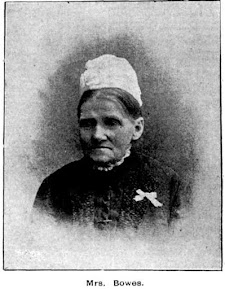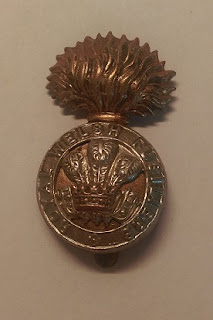A Mother for All!
As we approach Mother's Day
here in Australia, let's reflect upon a mother who fought to make every mother's
life better. A woman, who in times where men would drink their weekly wages,
leaving almost nothing for his family to be fed and clothed on, fought hard to
make a difference.
EUPHEMIA BRIDGES BOWES
Euphemia was born in
Edinburgh Scotland in 1816, the daughter of Joseph Allen and his wife Eliza.
She was self-educated, an activity rare for a young girl at the time, teaching
herself both to read and write. She arrived in Sydney in 1838, classified as a
"house servant” and on the 13th of September 1842 she married John Bowes, a
baker, with Wesleyan Methodist rites at Parramatta. John had arrived in Sydney
the previous year and moved to Parramatta, where besides his everyday position,
he continued his work as a Wesleyan lay teacher. They resided in Sydney before
making a move to Wollongong in 1848 when John was accepted into the Ministry.
Euphemia bore eleven
children, eight of whom survived childhood. Together with raising that large family she was also expected to undertake all the parish duties required of
the wife of a Minister. To make matters even more complicated she had to move
around the country area circuits upending her family every three years as John
was appointed to places such as Camden, the Turon, Singleton, the Macleay, the
Manning and Mittagong. In 1880, John retired to the inner Sydney suburb of
Stanmore as a "supernumerary", all the time with the extremely organised,
greatly respected Euphemia by his side.
Euphemia Bridges Bowes in latter years - Wikipedia
After the move to Stanmore,
Euphemia founded the first Women's Christian Temperance Union in Sydney in
1882. The Union was first set up in Ohio USA in order to close saloons and
operated in the context of religion and reform, including missionary work and
women's suffrage. Within two years of its formation new affiliates besides
Australia sprang up in Canada, the Netherlands, Finland, India, Japan, New
Zealand, Norway. United Kingdom, South Korea among others. Its members were
inspired by the Greek writer Xenophon, who defined temperance as
"moderation in all things healthful; total abstinence from all things
harmful." In other words, should something be bad for you, it should be
avoided altogether - like the dangers of alcohol. It was also involved in a
broad range of social and political reform activities and totally committed to
the welfare of women and children.
The Union in Sydney was the
first to adopt the cause of female suffrage in Australia. Euphemia was elected
President in 1885-1892 and remained active until her death. She felt that by
giving women voting rights would be an excellent means of establishing control
over the sale and consumption of liquor and as such used her former contacts
from her time in the rural community to set up new regional unions. Euphemia
was voted honorary life President in 1893 due to her substantial contribution
to the movement.
Besides this Euphemia was a
productive campaigner for a variety of measure to decrease alcohol consumption
in the colony. She successfully developed licensing restrictions and the
limitation of Sunday training. Although she campaigned hard, she was unable to
ban the use of barmaids.
Euphemia was one of five
women who founded a ladies' committee as an offshoot of the NSW Social Purity
Society in 1886. As part of their agenda the committee secured several pieces
of legislation to better protect women. The elevation of the age of consent
from 14 years to 18 years was one, as well as new measures against solicitation, brothels
and child prostitution.
She organised other groups
such as the NSW Local Option League to support the movement for advocating for
votes for women seen as a reforming influence.
John, in the meantime, had
opened a "Ladies College" in their home at Marrickville which
Euphemia and some of her daughters continued to conduct after his death in
October 1891.
Euphemia Bridges Bowes died
at home on the 12th of November 1900, aged 85, working up to the time of her
demise. She and John are buried in the Wesleyan section of the Cemetery. Her
funeral was largely attended on the 14th of November with many representatives
from Temperance Unions far and wide at the Stanmore Wesleyan Church on onwards to the Cemetery with the
internment carried out at the graveside. Reports say there were some 40-50
wreaths.
Euphemia and John's grave at Rookwood - find-a-grave with thanks.
Close up of headstone - find-a-grave with thanks.
She was survived by three
sons and four daughters. Her eldest son, John Wesley Bowes, became a
Politician, representing Morpeth in the Legislative Assembly in 1887-1889 and
is buried near his parents. Two other sons joined the Methodist Ministry, and
her daughter Eva continued her mother's work for temperance as corresponding
secretary for the Woman's Christian Temperance Union of NSW in 1912-1936.
John Wesley Bowes headstone at Rookwood - find-a-grave with thanks.
Euphemia believed in
fairness to all and that of a strong family life. She believed this could never
be achieved if alcohol became an overwhelming part of it, leading to the
breakdown of the family, resulting in poverty and devaluation of womenkind.
Truly a mother to all women
and children.
Rest in Peace Euphemia.
For today's references I
have drawn mainly upon the Australian Dictionary of Biography by Heather Radi
1979, SMH Thursday 15th of November 1900, a number of Wikipedia articles and
Ancestry.com.
If you have any comments to
make about Euphemia or any of the other wonderful women who have made a
difference to our lives, please add this here or at the Group Facebook page at
rookwoodcemeterydiscoveries
or send me a personal email
at
lorainepunch@gmail.com
Until next week







What a Lady…another great read .
ReplyDeleteYes what a woman!
Delete